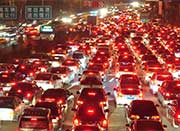


Chinese President Xi Jinping is scheduled to visit the UK from October 19 to 23 at the invitation of Queen Elizabeth II, a trip that symbolizes closer ties between China and the UK, where bilateral relations are said to be entering "a golden era."
The trip will be the first state visit to the country by a Chinese president in 10 years, since former Chinese president Hu Jintao's visit in 2005.
A slew of deals involving the energy sector, real estate, finance, medical treatment and automobiles will be signed, China's foreign ministry said at a press conference on Tuesday, declining to reveal more details.
Xi and his wife, Peng Liyuan, who will accompany him during the trip, will stay at the Queen's official residence at Buckingham Palace where they are expected to attend a luncheon followed by a state banquet later at night.
Xi is set to meet UK Prime Minister David Cameron and address the UK parliament. He will meet leaders of opposition parties, and address a banquet hosted by the Lord Mayor of the City of London.
The trip will also take him to Manchester in northern England where he will visit some research and commercial programs, the foreign ministry said.
"Xi's visit can be seen as an active response to goodwill from the UK side," Cui Hongjian, director of the department of EU Studies at the China Institute of International Studies, told the Global Times on Tuesday.
A source familiar with the matter said a "political document" will be signed during Xi's trip to help transform the anticipations of a "golden era" - a term coined by the UK side to describe the closer economic, political and diplomatic ties - into something more substantial and legally binding.
"[The document] will provide new dimensions to the comprehensive strategic partnership that already exists between China and the UK and help chart the midterm or even long-term course for the development of Sino-UK relations. To some extent, [China wishes] to make the Sino-UK relationship a model for relations with other Western countries," the source said.
Nuclear plant deal
Analysts believe deals to be signed during Xi's trip include contracts for the HS2 high-speed rail line and the Hinkley Point nuclear power station, for which UK Chancellor George Osborne offered an initial 2 billion pound ($3 billion) treasury guarantee to secure China's participation.
China is also planning to push forward financial cooperation such as issuing short-term yuan debt in London, a first outside of China, and a feasibility study to link the Chinese stock market directly to the London stock exchange.
"The complementarity of the two countries' economic structures has drawn China and the UK closer. En route to making the yuan a global reserve currency, Beijing has much to learn from London, which is a dominant force in global foreign exchange trading," Wang Yiwei, director of the Institute of International Affairs at the Renmin University of China, told the Global Times on Tuesday.
He believes that the UK's openness to Chinese investment in key areas such as energy and infrastructure, which often fall under protectionism in other countries, is crucial to economic cooperation between the two countries.
"The UK's pragmatic approach to adopting a deal-by-deal negotiation model, rather than an all-encompassing and reciprocal treaty, is another reason that attracts Chinese investment," Wang noted.
Opportunity in China
Xi's trip to the UK comes roughly three weeks after his visit to the US where a range of thorny topics, such as cyber espionage and the South China Sea, were discussed.
The vast difference between the somewhat tense relations with the US and the warmth in Sino-UK ties has led media, such as the Financial Times, to believe that Xi's trip marks "a divergence between London and Washington on a big issue for foreign policy."
London also angered Washington with its unilateral decision to join the China-initiated Asia Infrastructure Investment Bank in March.
"As a global superpower, the US tends to see China as an adversary and its rise as a threat, whereas Britain, in a different position with a different mind-set, sees opportunity in China's development," Cui said.
Britain is China's second-largest trading partner, second-largest origin of actual investment and investment destination within the European Union, while China ranks as Britain's fourth-largest trading partner.
Upon his return from London to Beijing, Xi will host French President François Hollande, who will visit China in early November, and German Chancellor Angela Merkel, who will reportedly pay a visit to China later this year.
Analysts believe Xi's UK trip is the beginning of China's fourth-quarter diplomatic season focusing on Europe.
"A warm Sino-UK relationship also benefits China's ties with France and Germany. It may also spark changes in our ties with the US," Cui noted.

Day|Week

 In pics: J-15 Carrier-Based Fighter takes off from Liaoning aircraft carrier
In pics: J-15 Carrier-Based Fighter takes off from Liaoning aircraft carrier In pics: army beauties across world
In pics: army beauties across world Air stewardesses packed into overhead bin
Air stewardesses packed into overhead bin China enters Go Away, Mr. Tumor for 88th Oscars
China enters Go Away, Mr. Tumor for 88th Oscars Highlights of the National Day holiday
Highlights of the National Day holiday Chinese peacekeeping forces in South Sudan encounter armed conflicts
Chinese peacekeeping forces in South Sudan encounter armed conflicts "Luxury" art apples debut in Shanghai
"Luxury" art apples debut in Shanghai Photos and hand-painted pictures brighten the military training life
Photos and hand-painted pictures brighten the military training life Models steal the light at Nanjing auto expo
Models steal the light at Nanjing auto expo Magnificent Xian H-6 strategic bomber
Magnificent Xian H-6 strategic bomber